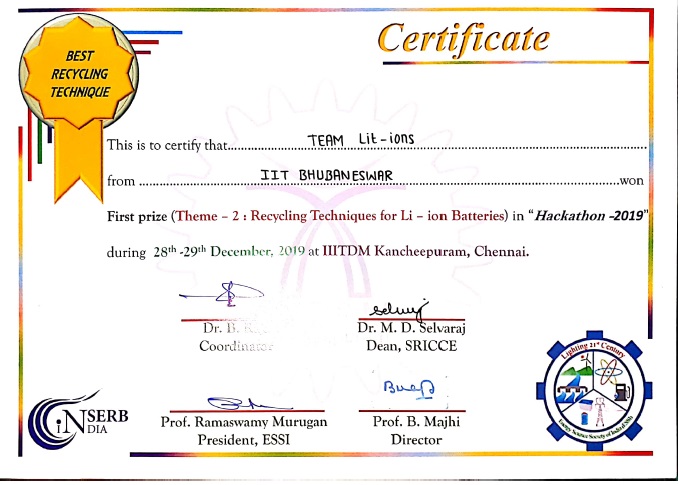IIT Bhuabaneswar students secure the First Prize at Smart Hackathon held at IIITDM Kancheepuram

03rd Jan, 2019, Bhubaneswar: Smart Hackathon at IIITDM Kancheepuram is a three day workshop on battery technology for e-vehicles, smart innovative glove box design and recycling techniques for lithium-ion batteries. This is a part of Shri. Narendra Modi, Hon’ble Prime Minister’s vision for 2030 for adoption of 100 percent electric vehicle transportation system in India. The event was supported by DST-SERB and Energy Science Society of India (ESSI). The third year B.Tech Students of School of Mineral, Materials and Metallurgical Engineering at IIT Bhubaneswar won the first prize in the IIITDM_K Hackathon on Recycling of Lithium-ion Battery. This is again a significant achievement by the students at IIT Bhubaneswar who have in the recent past have won many national level competitions and hackathons consecutively in a row.
The team Lit-ions members were Gurudev Singh, Sarthak Patnaik, Vinay Ahir, Yogesh Sarma Sedai. The project guide was Dr. Soobhankar Pati, Assistant Professor, School of Minerals, Materials and Metallurgical Engineering.
Speaking on the happy occasion, Prof. RV Raja Kumar congratulated the students, their guide and said, “We have been marching ahead and constantly striving to raise the standards of the operations of the Institute on all fronts such as quality of education including teaching, learning, research and faculty and scaling up the current infrastructure in this endeavour. The strategic initiatives taken by the Institute in the recent times have not only fostered the development of the Institute, but also resulted in a significant rise in Institute’s ranking performance on all national and international frameworks, indicating that our plans are right and we are on the right track.”
This project was based on Lithium-Ion Batteries recycling, it was a process of direct recycling of lithium-ion batteries which caters to the needs of the e-vehicles which is currently the need of the hour helping to minimize the harmful impact on the environment. The effect of this solution on the energy, electric vehicle transportation system, and utilities sector will be significant. This recycling process was unique in the sense that we directly recovered cathodic material as the end product. The cathodic content that is recovered requires minimal post-processing steps before being stacked in a battery. The process is comparatively simple and cost-effective than traditional methods. The team at IIT Bhubaneswar would like to see that this process gets implemented in the future to serve the energy needs of the country.

